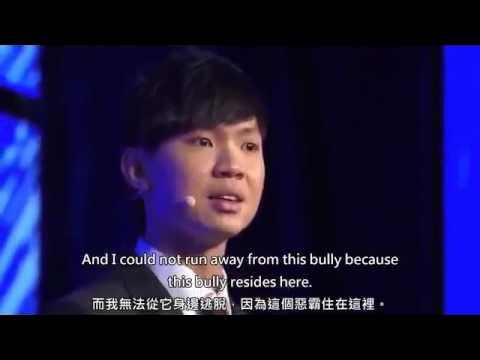Your Inner Critic: The Global Crisis No One Is Talking About | Elizabeth Lombardo | TEDxUIUC
Summary
TLDRIn this empowering speech, Elizabeth addresses the universal presence of the 'inner critic,' a voice of self-doubt named Mitzi. She illustrates the impact of conditional self-worth on mental health and behavior, highlighting issues like perfectionism, impostor syndrome, and cyberbullying. Elizabeth advocates for unconditional self-worth, a belief in oneself regardless of external conditions, as a means to overcome the inner critic and let one's light shine. She offers practical advice on cultivating this mindset through identifying and applying personal values, sharing a relatable story of breaking through a metaphorical and literal barrier.
Takeaways
- 🗣️ The script discusses the concept of an 'inner critic', a voice in our heads that often brings us down with negative and condescending comments.
- 🤔 The inner critic, named 'Mitzi' in the script, is always present, affecting self-perception and actions, and can be a source of self-doubt and anxiety.
- 🏋️♀️ The story of a seminar where the speaker had to break a board illustrates the power of focus and how self-doubt can hinder our performance.
- 👗 A wardrobe malfunction during the board-breaking exercise symbolizes how focusing on obstacles can stop us, but shifting focus to the solution can lead to success.
- 🔄 The script emphasizes the global crisis of conditional self-worth, where self-belief is dependent on meeting certain conditions or external validation.
- 🤳 The impact of social media on self-worth is highlighted, showing how comparing ourselves to others online can lead to feelings of inadequacy and depression.
- 💡 Conditional self-worth manifests in various behaviors such as perfectionism, impostor syndrome, bullying, arrogance, and even road rage.
- 🚫 The script suggests that superficial affirmations and narcissism are not solutions, as they still involve conditional self-worth based on comparison.
- 💡 Unconditional self-worth is presented as the antidote to the inner critic, where self-belief is not dependent on external conditions or achievements.
- 🌟 Cultivating unconditional self-worth involves identifying and applying personal values, which can help to overpower the inner critic and allow one's inner light to shine.
- 🔑 The speaker provides an exercise to identify values by admiring someone and recognizing the same qualities in oneself, suggesting that this can lead to the emergence of unconditional self-worth.
Q & A
What is the main theme of the transcript?
-The main theme of the transcript is overcoming the negative impact of the inner critic, also referred to as 'Mitzi,' and developing unconditional self-worth.
Who is Mitzi in the context of the transcript?
-In the transcript, Mitzi is a metaphorical representation of the inner critic, the voice in one's head that is critical and often brings one down.
What is the connection between the inner critic and conditional self-worth?
-The inner critic is linked to conditional self-worth as it often dictates one's self-worth based on external conditions or achievements, rather than inherent value.
What is an example of conditional self-worth mentioned in the transcript?
-An example of conditional self-worth given is believing in oneself only if certain conditions are met, such as receiving a certain number of likes on social media or getting an 'A' grade.
How does the speaker describe the impact of conditional self-worth on an individual's life?
-The speaker describes the impact of conditional self-worth as limiting and controlling, leading to behaviors like perfectionism, impostor syndrome, bullying, and arrogance.
What is the antidote to conditional self-worth according to the transcript?
-The antidote to conditional self-worth is unconditional self-worth, which is the belief in oneself regardless of external conditions or outcomes.
What is the significance of the board-breaking exercise in the transcript?
-The board-breaking exercise serves as a metaphor for overcoming self-doubt and the inner critic, illustrating the power of focusing beyond the obstacle and believing in one's ability to succeed.
How does the speaker suggest cultivating unconditional self-worth?
-The speaker suggests cultivating unconditional self-worth by applying the values that are most important to the individual, which can lead to self-acceptance and a reduction in the influence of the inner critic.
What exercise does the speaker propose to help identify one's values?
-The speaker proposes an exercise where one identifies a person they admire and then determines what characteristic of that person they admire, which is also a characteristic they admire in themselves.
How can applying one's values lead to the emergence of unconditional self-worth?
-Applying one's values can lead to the emergence of unconditional self-worth by allowing individuals to act in alignment with their beliefs and principles, thus fostering self-acceptance and reducing the need for external validation.
What is the final message the speaker conveys about the power of unconditional self-worth?
-The final message is that when unconditional self-worth emerges, it allows individuals to control their inner critic, enabling their inner light to shine through and overcome even the darkest of times.
Outlines

This section is available to paid users only. Please upgrade to access this part.
Upgrade NowMindmap

This section is available to paid users only. Please upgrade to access this part.
Upgrade NowKeywords

This section is available to paid users only. Please upgrade to access this part.
Upgrade NowHighlights

This section is available to paid users only. Please upgrade to access this part.
Upgrade NowTranscripts

This section is available to paid users only. Please upgrade to access this part.
Upgrade NowBrowse More Related Video

How Does Your Critic Function Work? | EgoHackers

Anxiety - Short Film

[Eng Sub]Darren Tay_Toastmasters 2016 World Champion of Public Speaking_"Outsmart, Outlast”

Why We Think We Are Losers (But Actually Aren't)

How To Silence The Inner Critic And Stop Being Mean To Yourself

How to Tame a Pitiless Inner Critic
5.0 / 5 (0 votes)